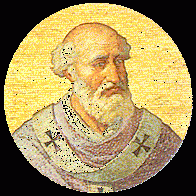In early 1095 AD, Byzantine emperor Alexios I Komnenos sent a letter to Pope Urban II warning that the Turks were about to overrun Constantinople. Hoping to reunite the Church, which had been in schism for 50 years, the Pope gave an impassioned speech at the Council of Clermont decrying the atrocities being committed by the Turks in their westward expansion and called for volunteers to launch a crusade to push them back.
Pope Urban II by Wikipedia Commons
Reports of the speech claim the crowd shouted in support "Deus vult," a Latin phrase meaning "God wills it!" The Pope's speech was just as well received across the empire, causing not only nobles and knights to join the cause, but the poor masses as well. Women and children were explicitly forbidden from joining the crusade, but to no avail; indeed whole families left everything they had to join this crusade, the first of many.
Most of the poor and untrained crusaders died in the long journey across Europe or were killed in early battles. Some of those who survived joined a group called the Tafurs, savage cannibals who when sacking Muslim cities would rape and massacre the population. Historian Michael Haag notes that Urban "had intended a campaign with limited objectives, but in reality the crusade tended constantly to become what the common people wanted it to be, a war to exterminate "the sons of whores' as the Tafurs called the Muslims." The leaders of the crusade were unable to control them and at one point, the Tafurs murdered up to ten thousand Muslims who had surrendered the night before.
Scholars believe that the initial motivation for most of the crusaders was not greed, but rather religious zeal and obedience to faith. The Pope had unintentionally tapped into the mass psychology of the Holy Roman Empire. The first crusaders may not be the first army ever motivated by nationalism, but they were arguably the first to have such lasting consequences for global relations. Such is the power of unchained societal fervor.
Geopolitics are certainly important and can move nations over long periods of time, but unchecked nationalism can shift the history of the entire world in the blink of an eye, and nationalism has a way of sneaking up on you and it can come from the most unlikely of sources.
Take for example World War I, which was sparked by the assassination of Archduke Franz Ferdinand. The assassin was Gavrilo Princip, a 20-year-old with little more than a high-school education. He opposed the unification of several Slavic countries which would eventually become Yugoslavia, of which the Archduke was a proponent.
This, in conjunction with a series of complicated military alliances, runaway imperialism, and an emphasis on aggressive military tactics, lead to the largest war mankind had ever seen.
Today, we can see rising levels of nationalism in China, where protesters are opposing Japan's claim on a series of islands known as the Senkaku to the Japanese and the Diaoyu to the Chinese. Protests popped up in several cities across the country. The Chinese government even deployed riot police to protect the Japanese embassy in Beijing. CNN reports:
"China normally clamps down on public demonstrations, but has allowed the protests to go ahead. Protesters carried banners that read 'Don't Forget the National Humiliation,' according to photographs distributed by the state-run news agency Xinhua."
If the Chinese people are willing to protest the acquisition of a set of strategically irrelevant islands, imagine how they would react in the face of a trade war with the US. A full-fledged currency war is already underway. Eventually, name-calling will ensue, but it won't end there.
Meanwhile in the US, politicians are already condemning the Chinese manipulation of their currency, even as the Treasury and the Federal Reserve dubiously begin to monetize the debt.
Nationalism in the US is currently benign, with accusations toward other nations being limited to Iranian nuclear power and Chinese currency manipulation, This is of course, a highly hypocritical statement for the US to make, but nationalism is rarely, if ever, logical. At some point, nationalism in the US will almost certainly begin to escalate.
Nationalism should not be confused with patriotism, which is primarily an admirable trait. To be a nationalist is similar to being a racist in that it is the belief that one nation is inherently superior to another, whereas a patriot is simply someone who loves their country.
(Note: You can view every article as one long page if you sign up as an Advocate Member, or higher).





